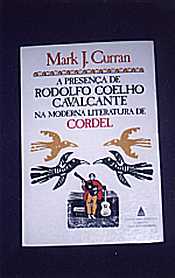 This lengthy book on perhaps the most visible poet and
publisher of modern cordel, Rodolfo Coelho Cavalcante, Alagoan
but longtime resident of Salvador da Bahia, is simultaneously biography,
anthology and analysis of RCC’s almost fifty year career production of cordel.
But it is more because through RCC’s role as propagandist of the
poets and poetry of cordel since 1955, one in effect sees the evolution
of the same during one-half of its existence in Brazil.
This lengthy book on perhaps the most visible poet and
publisher of modern cordel, Rodolfo Coelho Cavalcante, Alagoan
but longtime resident of Salvador da Bahia, is simultaneously biography,
anthology and analysis of RCC’s almost fifty year career production of cordel.
But it is more because through RCC’s role as propagandist of the
poets and poetry of cordel since 1955, one in effect sees the evolution
of the same during one-half of its existence in Brazil.
RCC was admired and criticized, loved and hated, but no one can deny
his amazing production: self-proclaimed author of 1,700 titles in cordel.
He also as self-proclaimed leader of the “poetic” class
defended the poets themselves and gave unheard of visibility to them through
national congresses financed on a shoestring in Salvador da Bahia in 1955 and
São Paulo in 1960. He continued
his mission after 1955 to popularize cordel as a tabloid journalist who
for thirty years made known and defended cordel to Brazilians who were
just beginning to recognize and appreciate its value.
RCC was colorful, dynamic and always looking to the future; his life
and works are synthesized in this book. The
first chapters tell of his youth dealing with and escaping an alcoholic father
and abuse at home, his adventures with small-town circuses in the Northeast
backlands where he became the creator of circus melodramas, his fling at
preaching the Protestant message, his conversion to Kardec spiritualism which
guided the rest of his life, and his incipient career as poet of cordel.
Part One also treats the “fire” of his early mission to cleanse cordel
of that minority of “immoral” chapbooks and organize congresses and
national organizations to make it known and honorable.
Yet another chapter deals with his many tabloid-style newspapers which
varied in content from self-aggrandizement to spiritualist message, to
divulging the poetry and poets of cordel.
Part Two of the book deals with his immense production of poems in cordel.
One discovers his views on poetry as a personal “gift.”
An anthology of his poems (really excerpts from the same) reveals his
major themes of religion, the moral “example,” homage and paid praise to
famous personages in the community and nation, but mainly a political document
of fifty years of Brazilian life. Rodolfo
documented Brazil from 1942 to 1986 -- the Integralist and Nazi threats of
World War II, the Communist threat and the Cold War, and the national
political chronicle from 1945 to his death in 1986.
He documented the ups and downs of the Vargas regime, the democratic
chaos of the Kubitschek, Quadros
and Goulart regimes, the military dictatorships from 1964 to 1985, and the
return to democracy via Tancredo Neves. Fervently
democratic and anti-communistic, his voice is the epitome of the conservative
vision of modern Brazil, conservative in moral view and social mores as well
as in politics.